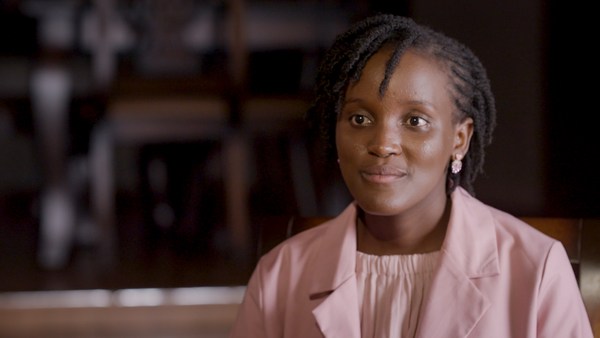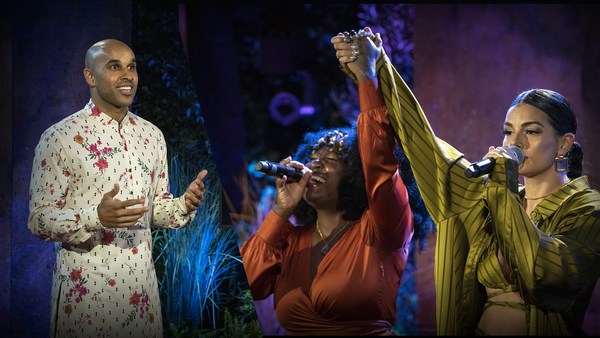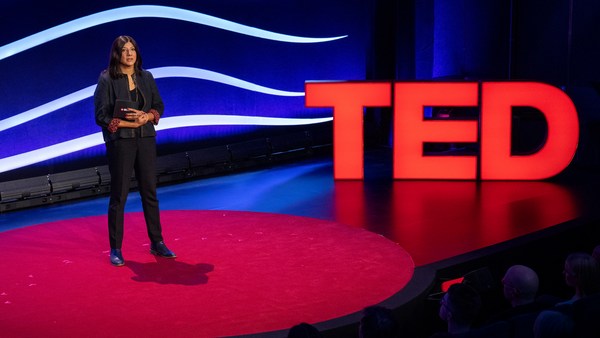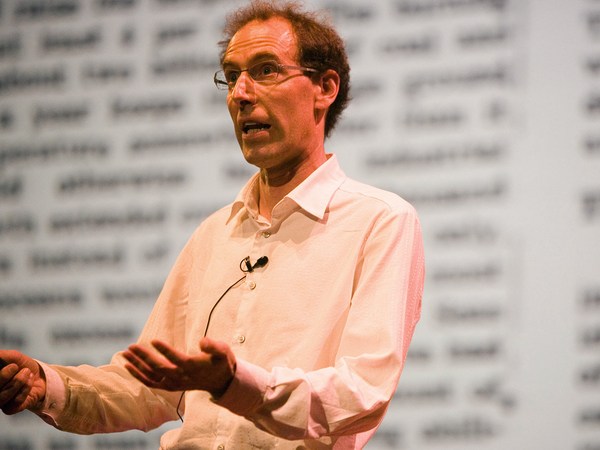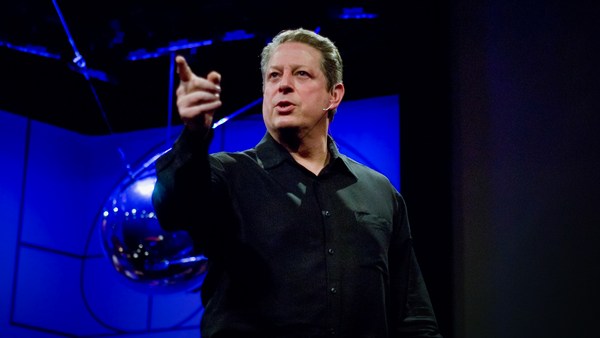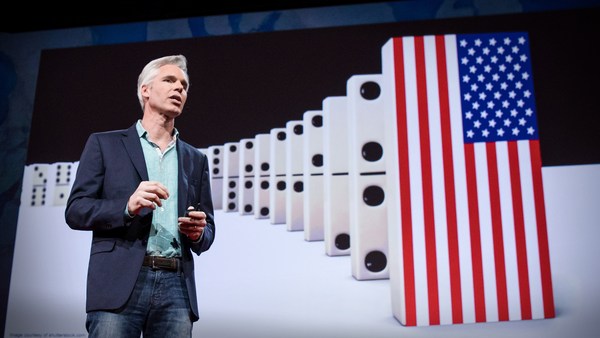Listen, I'm British-born and by a Nigerian raised. There were expectations, different ways I was supposed to go. My career options for one, some of you may already know. As an African, you get three choices. Please, repeat after me. You are going to be a doctor --
Audience: A doctor.
FB: A lawyer.
Audience: A lawyer.
FB: Or a business man.
Audience: Or a businessman.
FB: Now, I did a thing that brought on quite a bit of stress. That was me saying, "Mum, babes, I did my best, but that's not how I'm going to go. I'm going to be an actor."
"Why do you want to prostitute your emotions for money?" Was my mum's reaction.
Now, in all fairness, what I was asking for was this complete abstraction. But the more I succeeded, the more my mum could see, right? Her idea of what was possible was being reimagined with me.
I was the lead on the West End. I was about to be a part, a small part, a walk-on part in a massive film. I'm building my career and then boom. I’m falling apart, and it seems I am dealing with climate anxiety. Building my dream and watching the world literally burn in front of me and very little being done. I'm panicking. Frozen like a mannequin. Until I see environmental activism happening, and I jump in. But whilst on the protests and in the meeting rooms, a question takes over me. Why don't these people look like me? Why is it when I think about climate activism, I think about white middle-class people? Is it a white middle-class problem? A crisis that seems to require more time, effort, money, work to do or know anything about and I'm talking about those that have the privilege to think about anything else but survival. It feels like people of color experience barriers towards the forefront of the climate movement, and it seems that the reasons lie behind our underlining principles of survival. To keep your head down. Do your work, and don’t get into trouble. Survive, and dare to thrive. Protest, yeah, but only for imminent survival. See, we've got family that's been in this country for 40 years and still feel like new arrivals. And we have a history of disappearing in the night. Shipped off to someplace or just mourned. No room for the eco fight.
I mean, me Fehinti Balogun, on this stage right now doing a TED Talk, I am about four times more likely to have force used against me if I'm arrested than my white counterpart. I’m about seven times more likely to be stopped and searched. And with a new policing bill and public order bill, these biases are only set to increase. Noise restriction on protests. Criminalization of protesters without having to convict them of a crime. Police can stop and search anyone saying they have reasonable suspicion and threaten peaceful protest tactics. The fear is real.
So, you know. Keep your head down. Do your work. And don't get into trouble. Get yourself a piece of the pie, right? But that suggests the payoff will be in a world similar to the ones our parents grew up in.
London was hot, boy. Forty degrees, one of the hottest summers in history after one of the hottest summers in history. Some people couldn’t go outside. Plants were either dried up or on fire. Countries were either underwater or on fire. This extreme weather is only set to increase. If crops die, well, that makes food more expensive, affecting working class communities, communities of color first. That world that they grew up in is gone.
But what if, and go with me on this, what if climate change is just a symptom of a bigger problem? And what if it is the same problem that causes racism and sexism and ableism? What if all of these things are just symptoms of a bigger problem? Ready? White supremacist patriarchal capitalism.
(Applause)
It feels scary because it feels like a concept, even though our society is quite literally based on it. Infinite growth with finite resources at whatever the cost. Those forms of oppression wouldn't exist if it didn't make someone money. I mean, in the UK. slavery plantations in the Caribbean provided the raw materials needed for industrial change and growth in the British Empire, money. Not to mention the genocides and the conquests, more money. The liberation of oil by liberators, that deliberate the price of liberation whilst polluting soil. Get that money.
Shout out to Shell, by the way, who historically have taken oil from my country of origin, Nigeria. Nigeria, who pollutes almost ten times less than England. As do so many colonized countries, and you know what? It seems to me that some of the people who are the most affected pollute the least. The ones who have been historically stolen from.
Climate change is modern colonialism. So we know, with all of this, with a colonial mindset, with a capitalist mindset that even if we have a magical technology that clears the air and makes everything safe, it would only operate in certain neighborhoods. We’re dealing with structure. A structure that told me to keep my head down. A structure and a media that chose to omit that six percent of the population, Indigenous people, protect 80 percent of the world's biodiversity. Chose to omit that one of the most important climate protests in history was led by a Nigerian, Ken Saro-Wiwa of the Ogoni people. Chose to omit the effectiveness of grassroots movements and community action. People like BEN and Wretched of the Earth May Garden Projects, to name a few. Chose to omit the UK's constant investment in fossil fuels takes away from any aid it wants to send to countries like Pakistan but then reminds me I should recycle more.
If it is that structure that tells me it is about my own individual purpose and guilt, maybe it's worthless, I feel the power is in the masses. So I joined groups. Local and in my job like cooking. With all my different hobs. One being Equity for a Green New Deal. Pension divestment, putting pressure on heels. Then I took lessons from Copwatch UK. Taught me my rights with police arrests and interventions, discerning their intentions.
I learned I have to think radically now. About strategy. And kindness. Kindness for myself and those right behind us. To be held by them and to hold right back. Well, that’s community, right there is strategy in that.
Then what's my capacity? How much can I give? Because I got rent, auditions, I've got to live. And when I have my capacity, I think, well, what's my aim? Where am I helpful? How do I give weight to my claims? It's about strategy, right? So why integrate? Well, I speak to ignite, connect and always agitate.
Let's go back. Because this is important, agitate. Call out inaction, point to solution, tell the truth. Get all that money out of fossil fuels, pension investments, accounts, hand over power, make them want to be radical. Connect. There are people in spaces just like this that need to be connected to grassroots movements, who need the attention, the space, the funding, and they need you.
Ignite. Remind everybody watching that you are not powerless. That, "Ah man, there's nothing we can do, just keep going." is a symptom, not cure. That you stand on years worth of resistance and success, that you are needed. That you, just like my mum, have the power to reimagine what you think is possible.
So now we speak. We strategize. And we think: How does this action aid the next step?
Thank you.
(Applause and cheers)
